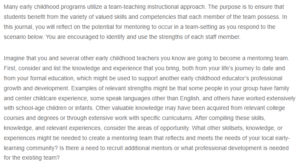Leadership and Collaboration-Empowering Early Childhood Education
Educational leaders create time to collaborate with others to set objectives that relate to the present professional needs. I am happy that two other childhood educators and I created a mentoring group. United, we desire to assist upcoming early childhood professionals to develop and grow. Leadership within an early childhood environment is the modest act of positively impacting individuals in the program setting (Chu, 2013). This is what we are planning. Our primary objective is to pool our competencies and skills to assist other educators in the field to acquire the necessary abilities to promote learning through all regions of learner progress.
Luckily, my life journey has shaped me into an effective collaborative team player. While in high school, I took up a leadership role by engaging in different clubs such as environment, debating clubs, and games. I also engaged in volunteer and community development activities and programs like helping the aged as adults. Besides, I gathered other skills for mentoring through the course and units I take in school, which have helped me develop better communication and teamwork skills. Nonetheless, the strength I bring to the mentoring program originates from my past life experiences and internship programs that ensured I could bring problem-solving, decision-making, communication, and organizational skills to my team. The second person is an educationist leader who designs and develops curriculums. Her knowledge and expertise will help give new ideas on the changes we can recommend. She can also redesign courses, evaluate their effectiveness, and even make training materials for students and teachers. Chu (2013) affirms that encouraging new ideas needs tried-and-true strategies. Therefore, her skills and knowledge will be necessary to effectively design the learning resources required for the mentoring program. The last person is a woman who has 18 years of experience in early childhood education. She has taught in numerous early education schools, worked with infants, and now owns an early childhood school. She will bring in all the experiences, ideas, and essential facts about early-child education that will be very important to the group. United, I believe we can encourage improved competency among early childhood experts while offering a course for deferential cooperation and free communication in the team. Ideally, our team needs no other skill sets apart from good communication and interpersonal skills and knowledge of the school curriculum. Sure, recruiting is appropriate. It will strengthen the team. Adding another person, especially a male with more than ten years in early childhood education, would fit our group because we will learn from them as they will be perfect mentors.
References
Chu, M. (2013). Developing mentoring and coaching relationships in early care and education: A reflective approach. Pearson Higher Ed.
ORDER A PLAGIARISM-FREE PAPER HERE
We’ll write everything from scratch
Question
Many early childhood programs utilize a team-teaching instructional approach. The purpose is to ensure that students benefit from the variety of valued skills and competencies that each member of the team possess. In this journal, you will reflect on the potential for mentoring to occur in a team-setting as you respond to the scenario below. You are encouraged to identify and use the strengths of each staff member.

Leadership and Collaboration-Empowering Early Childhood Education
Imagine that you and several other early childhood teachers you know are going to become a mentoring team. First, consider and list the knowledge and experience that you bring, both from your life’s journey to date and from your formal education, which might be used to support another early childhood educator’s professional growth and development. Examples of relevant strengths might be that some people in your group have family and center childcare experience, some speak languages other than English, and others have worked extensively with school-age children or infants. Other valuable knowledge may have been acquired from relevant college courses and degrees or through extensive work with specific curriculums. After compiling these skills, knowledge, and relevant experiences, consider the areas of opportunity. What other skillsets, knowledge, or experiences might be needed to create a mentoring team that reflects and meets the needs of your local early-learning community? Is there a need to recruit additional mentors or what professional development is needed for the existing team?

